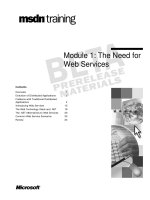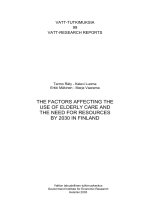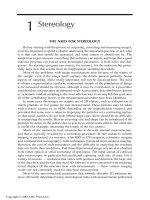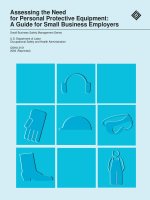The need for auxiliary verbs
Bạn đang xem bản rút gọn của tài liệu. Xem và tải ngay bản đầy đủ của tài liệu tại đây (9.3 KB, 2 trang )
The need for auxiliary verbs
English verbs have only a limited number of forms. For example, the typical English verb write has the following
forms: write, writes, wrote, written, writing. But these forms are not always sufficient to express all the
meanings. For example, ideas like questioning, negation, time, repetition, completion, willingness, obligation etc
cannot be expressed by using the simple forms of the verb. In order to express these ideas, a number of helping
or auxiliary verbs are added to other verbs. There are two kinds of auxiliary verbs.
Be, do and have
Be has different forms: is, am, are, was and were
Be is added to other verbs to make continuous and passive verb forms.
He is writing. (Present continuous)
They were singing. (Past continuous)
The dinner was cooked by my Dad. (Simple past – passive)
Do has three forms: do, does and did
Do is used to make questions, negatives and emphatic sentence forms.
Do you sing?
He doesn’t eat meat.
Do come in.
Have is used to make perfect verb forms. Its forms are: has, have and had
What have you done?
Where has she gone?
I realized that I hadn’t posted the letter.
Modal auxiliary verbs
The verbs will, shall, would, should, can, could, may, might, must and ought are called modal auxiliary verbs.
Modal auxiliary verbs are used with other verbs to express different degrees of certainty or obligation.
She must have arrived.
You ought to help him.
She said that she would help me.
Difference between auxiliary verbs and other verbs
There is an important difference between auxiliary verbs and other verbs. In sentences made with auxiliary verbs,
questions are made by simply putting the auxiliary verb before the subject. In sentences made with other verbs,
questions are made by putting do (or its forms) before the subject.
She can swim.
Can she swim?
She makes models from clay.
Does she make models from clay? (NOT Make she models from the clay?)
Stay on top of your writing! Download our grammar guide from www.englishgrammar.org to stay up-to-date.
Powered by TCPDF (www.tcpdf.org)









